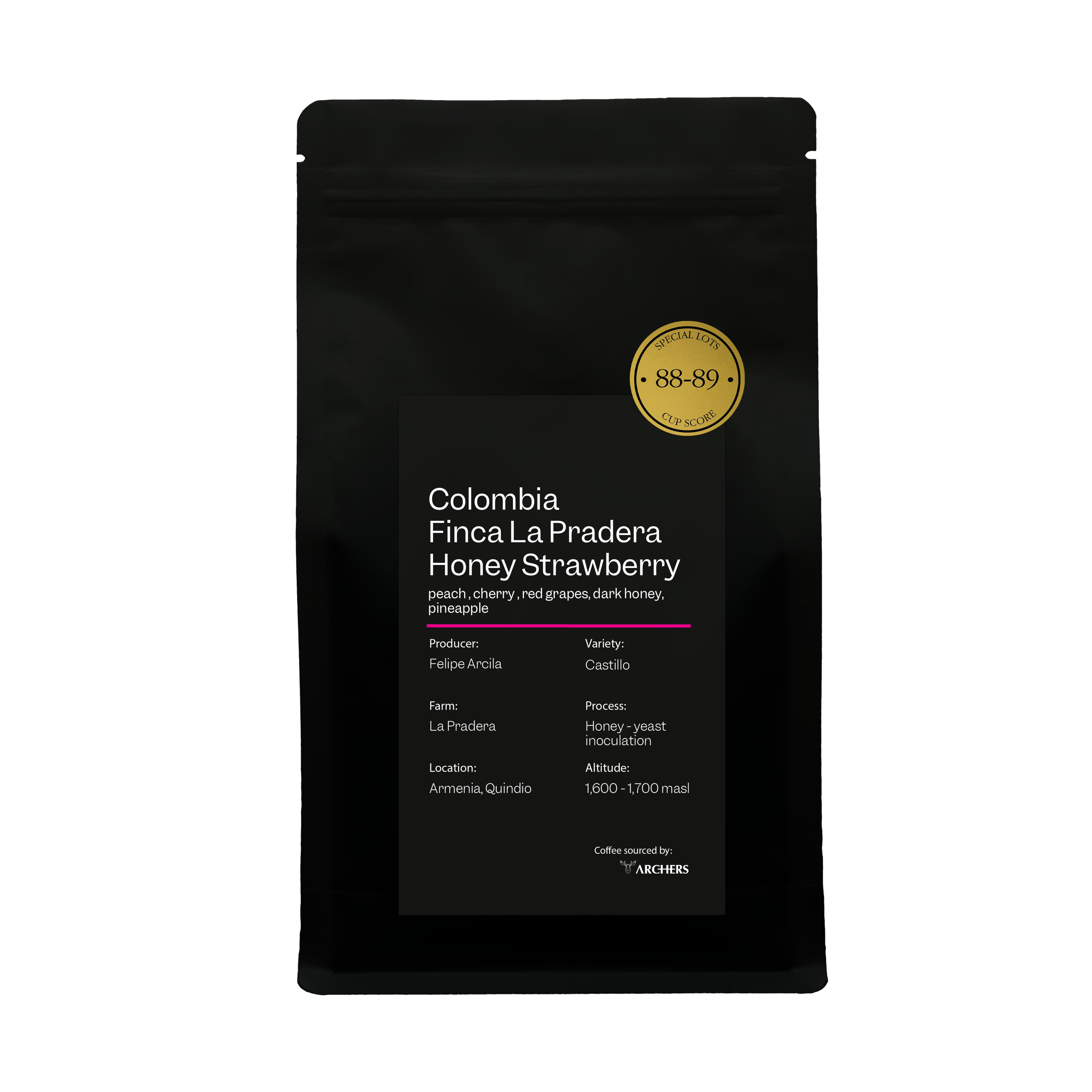
Colombia - Finca La Pradera Honey Strawberry
Tasting Notes
Description
Producer: Felipe Arcila Farm: Finca La PraderaLocation: Armenia, QuindioVariety: CastilloProcess: Honey-Yeast InoculationAltitude: 1,600 - 1,700 masl Fermentation ▪▪▪▫▫ Sweetness ▪▪▪▪▪ Acidity ▪▪▪▪▫ Roast ▪▪▫▫▫ Cofinet was established by brothers Carlos and Felipe Arcila, whose family history in coffee spans over 80 years. Their dedication to producing and distributing finer Colombian coffees has earned them a reputation as one of the world's renowned, larger-scale coffee distributors. Their long-running success is due to a steadfast commitment to quality and deep concern for and connections with the coffee growers they work with. Their application of such techniques on traditional and exotic varieties as well as relatively recent, resilient cultivars like Castillo, have been achieving the desired balance between productivity and cup quality. The Cofinet commitment to quality, sustainability, and ethical practices that allows them to produce great coffee goes hand in hand with their dedication to improving the lives of the people in communities where the coffees are grown is a key reason they enjoy high regard in the industry. As a family-owned business, their legacy spanning 80 years — from the earliest days of sourcing and locally distributing coffee to local exporters until their operations' recent expansion encompassing global distribution — has always been driven by their passion for advancing the Colombian coffee industry within the global market and along with that uplift the quality of life of the coffee-farming families they work with. The Castillo coffee variety is a hybrid introduced by Colombia's national coffee research institute, Cenicafe, in 2005. It was developed as an improvement from the earlier released cultivars Colombia/F6 (circa 1982) and Tabi (circa 2002), with a focus on enhancing resilience, productivity, and cup quality. Initially, Castillo was often described as dominantly chocolatey and cherry-like with subtle hints of citrus. However, there was a prevailing sentiment that it might not cup as well as older varieties such as Caturra. To challenge this notion, socially conscious and innovative began conducting post-harvest processing experiments. Their objective was to showcase that a hybrid variety like Castillo could exhibit exceptional cup quality while maintaining its resilience and productivity. These efforts not only increased awareness among Colombian coffee farmers about the benefits of planting disease-resistant varieties but also demonstrated that their coffees could compete and command premium prices based on cup quality. Whereas the traditional washed process tends to produce a clean, bright cup with a medium body and in contrast, the traditional natural typically results in a heavier-bodied cup with pronounced fruity characteristics — experimental or alternative processes have diversified the range of probable flavor profiles further. For instance, extended and anaerobic fermentation processes tend to increase the cup's complexity by intensifying fruit notes in the direction of dark, exotic, and even tropical fruits, and also enhancing mouthfeel and body. By using a Honey - Yeast Inoculation Process, where carefully selected yeasts were added during the fermentation phase, a multi-layered profile with commanding aromas of a ripe fruit medley in balance with complex acidity and an intensified sweetness.
Origin
Purchase
Similar Beans
Based on tasting notes and processing method

Colombia - Cerro Azul, Geisha Honey
Archers Coffee

Emporio Geisha, Popo Natural Lot 22A
Archers Coffee

Hacienda Barbara, Natural Anaerobic Lot 18
Archers Coffee

Panama - Abu Coffee - Geisha Natural Anaerobic Lot 1620
Archers Coffee